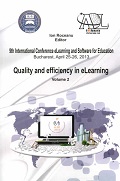LEARNING ABOUT HERITAGE THROUGH AUGMENTED REALITY GAMES
LEARNING ABOUT HERITAGE THROUGH AUGMENTED REALITY GAMES
Author(s): Gabriel Cristian Sabou, Irina MaiorescuSubject(s): Education
Published by: Carol I National Defence University Publishing House
Keywords: augmented reality; games; learning; heritage
Summary/Abstract: Compared to the way heritage assets are regarded in other developed nations, the Romanian ones are very often poorly managed, left unknown to the very own Romanian people, they are neglected and even damaged. Promoting and taking advantage of the country national heritage assets - be them tangible or intangible, involves first of all a raised awareness; it implies knowing about them and understanding their true meaning. Learning is the key to acquiring knowledge and people are prone to retaining information important to them or information that has a strong sensorial, emotional, cognitive impact upon them. As nowadays learning processes are more and more influenced by the powerful online environment and the complex technology, the sensitive area of heritage may take great benefits from it. National heritage assets bear within themselves historical and cultural information. They are the key to building a strong and proud national identity and a valuable social cohesion, to contributing to a sustainable economical development. As the way of retaining information and learning is changing, augmented reality gives the learner the live experience of the past and makes him aware of the heritage importance and of its true significance in the most appropriate way. The augmented reality technology makes the information more powerful by enhancing its substance with visual, audio and sensorial attributes, building thus a real live experience. The current paper aims to bring in discussion the possibilities of transmitting the knowledge about heritage assets through specific applications of augmented reality, making a particular reference to the educational games that transform learning into an entertaining activity.
Journal: Conference proceedings of »eLearning and Software for Education« (eLSE)
- Issue Year: 9/2013
- Issue No: 02
- Page Range: 87-92
- Page Count: 6
- Language: English

